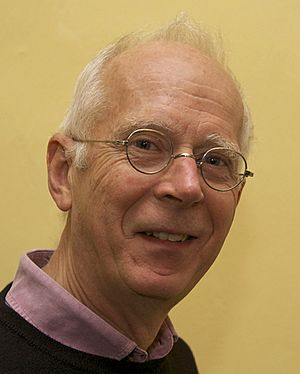David Baulcombe facts for kids
Quick facts for kids
David Baulcombe
FRS FMedSci MAE
|
|
|---|---|
 |
|
| Born |
David Charles Baulcombe
7 April 1952 Solihull, England
|
| Nationality | British |
| Alma mater |
|
| Known for |
|
| Spouse(s) | Rose Eden (m. 1976) |
| Children | 1 son, 3 daughters |
| Awards |
|
| Scientific career | |
| Fields | |
| Institutions |
|
| Thesis | The Processing and Intracellular Transport of Messenger RNA in a Higher Plant (1976) |
| Doctoral advisor | John Ingle |
| Doctoral students |
|
Sir David Charles Baulcombe is a famous British plant scientist and geneticist. He was born on April 7, 1952. He is known for his important discoveries about how genes work in plants.
As of October 2024, he was leading a research group at the University of Cambridge. He also held a special professor title there, called Regius Professor of Botany Emeritus. This means he was a very respected professor in the study of plants.
Contents
Early Life and Education
David Baulcombe grew up in Solihull, England. His family was not involved in science.
He went to the University of Leeds and earned a degree in botany (the study of plants) in 1973. He was 21 years old at the time.
He then continued his studies at the University of Edinburgh. In 1976, he earned his PhD. His research focused on how Messenger RNA (a type of genetic material) moves inside plants.
A Career in Plant Science
After finishing his PhD, David Baulcombe worked as a researcher in North America. He spent time at McGill University in Canada and the University of Georgia in the United States.
In 1980, he returned to the United Kingdom. He was given a great chance to start his own research team at the Plant Breeding Institute in Cambridge.
Moving to Norwich
In 1988, Baulcombe moved to Norwich and joined the Sainsbury Laboratory. He became a senior research scientist there. He also led the laboratory for several years.
He became an honorary professor at the University of East Anglia in 1998. By 2002, he was a full professor at that university.
Professor at Cambridge
In 2007, David Baulcombe became the Professor of Botany at the University of Cambridge. This was a very important role. He also became a Fellow at Trinity College, Cambridge in 2008.
In 2009, his professorship at Cambridge was renamed "Regius Professor of Botany." He held this position until 2020.
David Baulcombe has also been part of many important science groups. He was the president of the International Society of Plant Molecular Biology from 2003 to 2004.
Amazing Discoveries in Research
David Baulcombe's research has greatly helped us understand plants. He focused on how plants fight off viruses and how their genes are controlled. This is called gene silencing.
Understanding Gene Silencing
In 1998, other scientists discovered something called RNA interference. This is a way that cells can "turn off" specific genes.
David Baulcombe and his team then found a special type of molecule in plants called small interfering RNA. They showed that these tiny RNAs are key to how plants use gene silencing. This helps plants defend themselves against viruses.
His group also found that some viruses can actually stop this gene silencing process. This helps the viruses infect the plants.
Small RNA and Plant Defense
Baulcombe's work also showed how important small interfering RNA is for epigenetics. This is the study of how genes can be turned on or off without changing the DNA itself. His research also showed how these small RNAs help plants fight off diseases.
His discoveries have been very important for understanding biology, not just in plants but in all living things.
Awards and Honors
Sir David Baulcombe has received many awards for his scientific work.
In June 2009, he was made a Knight Bachelor by Queen Elizabeth II. This honor was given to him for his great contributions to plant science.
Some of his other major awards include:
- Wiley Prize (2003)
- Massry Prize (2005)
- Royal Medal (2006)
- Lasker Award (2008)
- Harvey Prize (2009)
- Wolf Prize in Agriculture (2010)
- Balzan Prize (2012)
- McClintock Prize (2014)
He was also elected as a Fellow of the Royal Society (FRS) in 2001. This is a very high honor for scientists in the UK.
Personal Life
Outside of his lab work, David Baulcombe is interested in using plant biotechnology to improve crops. He especially wants to help solve problems in developing countries.
He has said that he studies plants because they provide us with food, clothes, and paper. He also finds them to be great models for understanding general biology.
David Baulcombe married Rose Eden in 1976. They have four children: one son and three daughters. He enjoys music, sailing, and hiking in the hills.
 | Emma Amos |
 | Edward Mitchell Bannister |
 | Larry D. Alexander |
 | Ernie Barnes |

